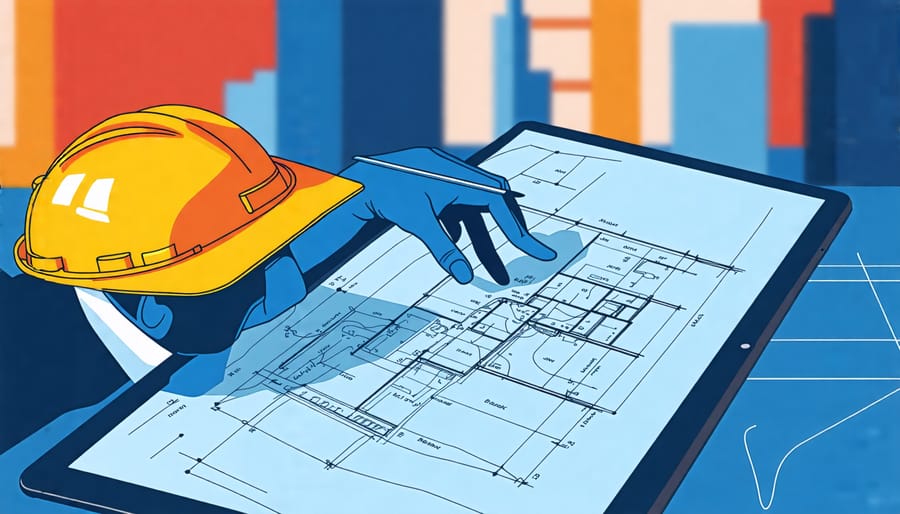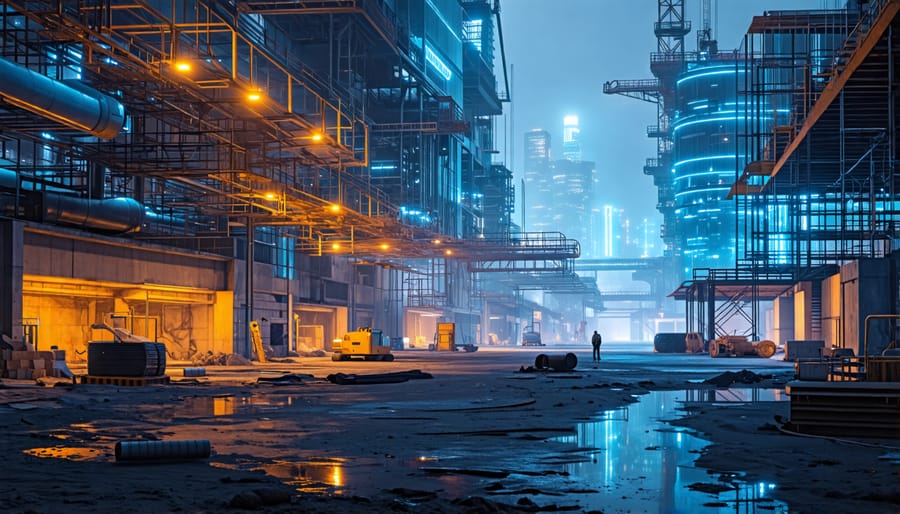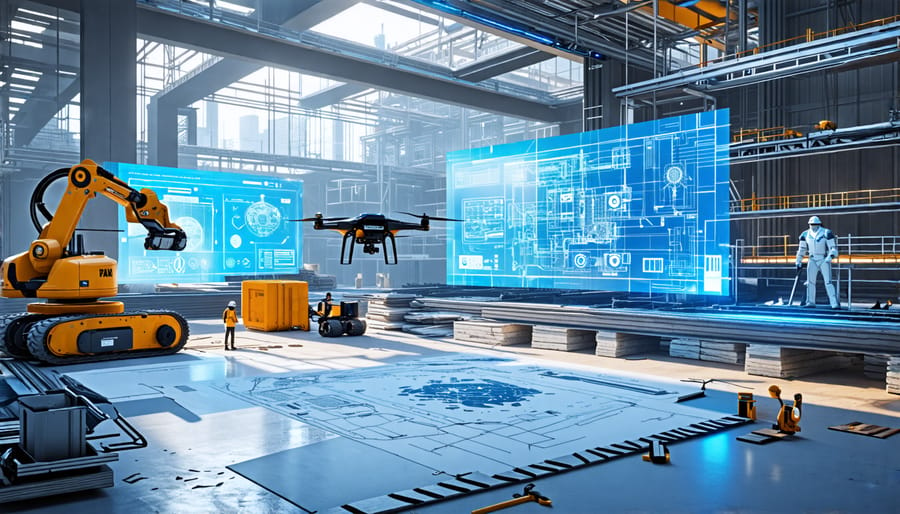Leverage predictive analytics to enhance project planning by utilizing AI algorithms to forecast potential delays and resource allocation needs. Implement autonomous machinery to boost efficiency and reduce operational costs, allowing for uninterrupted work and safer construction sites. Integrate AI-driven design tools to optimize architectural plans and improve structural accuracy through advanced simulations and adjustments. Employ real-time monitoring systems powered by AI to ensure compliance and safety standards, provide immediate issue resolution, and maintain project timelines.
AI Applications in Construction Today
AI in Design and Architecture
Artificial intelligence is increasingly transforming the landscape of design and architecture in construction. AI aids architects by enhancing their capacity to innovate, ensuring both efficiency and sustainability. By integrating AI with 3D BIM Modeling, professionals can optimize spatial arrangements and utilize data-driven insights to create more resilient structures. These tools help in quickly generating multiple design solutions, thereby streamlining decision-making processes.
AI analyzes vast amounts of data to predict environmental impacts, enabling architects to incorporate sustainable materials and energy-efficient practices into their designs right from the conceptual phase. For instance, AI-driven predictive modeling allows for precise climate assessments, ensuring that buildings are designed to withstand future ecological challenges. This not only reduces the carbon footprint of new structures but also extends their longevity.
Furthermore, AI systems offer architects a deeper understanding of user preferences and lifestyle needs through data analytics, creating spaces that genuinely enhance user experiences. Expert interviews reveal that as AI continues to evolve, its role in fusing creativity with analytical precision will only grow, heralding a new era of innovative, sustainable architecture that meets the high standards and evolving demands of construction professionals.

Enhancing Project Management through AI
The integration of artificial intelligence into the construction sector is serving as a cornerstone of the digital transformation reshaping the industry. AI enhances project management by significantly optimizing project timelines. Through predictive analytics, AI tools can forecast potential delays before they manifest, allowing for proactive schedule adjustments. This foresight ensures projects stay on track, minimizing downtime and increasing efficiency. Additionally, AI is instrumental in risk management, providing real-time analysis of construction sites to identify potential hazards. By predicting these risks, project managers can implement strategies to mitigate them effectively, enhancing overall site safety and reducing the likelihood of costly errors.
Communication, a pivotal element of project success, is also transformed by AI through advanced platforms that streamline interactions among team members. These platforms enable seamless sharing of updates, documents, and feedback, ensuring all stakeholders are aligned with project objectives. This clarity fosters a collaborative environment, crucial in complex construction projects where miscommunications can lead to significant setbacks. As AI continues to evolve, its role in project management will likely expand, driving innovation and setting new standards of excellence across the construction industry. Experts agree that embracing AI not only offers immediate operational benefits but also positions companies competitively for future advancements.

Case Studies: Success Stories in AI-Driven Construction
Smart Building Technologies
In a landmark project, an innovative approach utilizing AI transformed the Merdeka 118 skyscraper in Kuala Lumpur into a paradigm of smart building technologies. By integrating AI, the project’s team enhanced energy efficiency, optimized climate control, and improved occupant safety. Utilizing machine learning algorithms, the building’s systems continuously analyze vast amounts of data from sensors deployed throughout the structure. This enables real-time adjustments to lighting, heating, and cooling systems, resulting in significant energy savings and increased sustainability.
Additionally, AI-powered predictive maintenance systems monitor the health of critical infrastructure components, anticipating potential failures before they occur. This proactive approach ensures uninterrupted operation and extends the lifespan of building systems. The advanced AI applications have also improved occupant experiences by adjusting environmental settings to align with occupant preferences, demonstrating a user-centered design ethos. This groundbreaking initiative not only highlights the potential of AI in constructing intelligent ecosystems but also sets a precedent for future developments in the construction industry.
AI in Predictive Maintenance
In a landmark project for a leading construction firm, deploying AI for predictive maintenance proved transformative. The project involved integrating AI algorithms with IoT sensors across a large commercial building. By continuously monitoring equipment like HVAC systems and elevators, AI analyzed real-time data to predict potential failures. Remarkably, the AI could foresee issues such as overheating motors or pressure anomalies days before traditional methods could detect them.
One notable instance included predicting an imminent HVAC failure that, if gone unnoticed, could have led to significant downtime and costly repairs. Instead, the AI system triggered an alert, allowing the maintenance team to address the issue proactively. This not only prevented operational disruptions but also extended the lifespan of the equipment.
Such predictive capabilities illustrate the profound impact AI can have on construction maintenance operations, highlighting cost savings and efficiency improvements, and setting a new standard for maintenance strategies in the industry.
Challenges and Considerations with AI Implementation
Data Privacy and Security
As AI revolutionizes the construction industry, data privacy and security have become paramount concerns for stakeholders. Utilization of the power of construction data necessitates robust strategies to protect sensitive information from breaches. Construction professionals must ensure compliance with data protection regulations like GDPR or CCPA, focusing on meticulous data governance and responsible AI deployment. This includes encrypting data at all stages—collection, storage, and transmission—minimizing the risk of unauthorized access. AI systems should be transparent and auditable, allowing for traceability of decisions and fostering trust among project teams. Regularly updating security protocols and conducting audits further solidify defenses against cyber threats. Industry leaders underscore the importance of educating teams about potential vulnerabilities, cultivating a culture of security mindfulness. By addressing these concerns diligently, the construction sector can fully leverage AI’s capabilities while safeguarding stakeholder trust and maintaining regulatory compliance.
Cost and Training Barriers
Adopting AI technologies in the construction sector presents significant financial and educational challenges that can impede integration efforts. Financially, construction companies face substantial initial costs, including purchasing advanced hardware and software systems, which can strain budgets, particularly for smaller firms. Additionally, the ongoing investment in upgrades and maintenance of AI systems demands careful financial planning and allocation of resources. Beyond just the technology itself, expenses for data management and cybersecurity measures also need consideration to safeguard sensitive project data, further adding to the financial burden.
From an educational perspective, there is a notable skill gap within the industry. Implementing AI requires construction professionals to possess a certain level of technical expertise, often necessitating comprehensive training programs. Companies must invest in upskilling their workforce, which involves both time and cost. Many workers may feel intimidated by these new technologies, requiring thoughtful change management strategies to foster acceptance and comprehension. Overcoming these barriers involves targeted training initiatives that promote not only technological proficiency but also adaptability among team members.
Overall, while AI promises to revolutionize construction processes and efficiency, addressing the financial and educational barriers is crucial. Companies that strategically plan for these challenges and invest in necessary resources and training are more likely to realize AI’s potential benefits effectively.
The Future of AI in Construction
The construction industry stands on the brink of a technological revolution, with AI poised to reshape the landscape dramatically. As AI continues to advance, its role in construction will likely expand beyond current capabilities like predictive analytics and autonomous machinery. One emerging trend is the integration of AI with Building Information Modeling (BIM), enabling seamless synchronization of design, planning, and execution processes. This integration could enhance efficiency and accuracy, reducing costs and time significantly.
AI’s potential to drive sustainability in construction is also notable. By optimizing resource allocation and minimizing waste, AI systems can support environmentally friendly practices critical to building a greener future. This development could lead to increased demand for sustainability careers within the industry, as professionals will be needed to navigate and implement these advancements.
Moreover, AI will likely catalyze advancements in construction safety. Through real-time data analysis and monitoring, AI can proactively identify hazards, ensuring worker safety and compliance with industry standards. The future might also see construction site automation on a larger scale, with AI-powered robots handling repetitive tasks, allowing human workers to focus on more complex, strategic aspects of construction projects.
As AI in construction evolves, these tools promise to transform not just the way we build but also who builds and how. However, successful integration will require stakeholders to overcome challenges like data privacy concerns and the need for upskilling the workforce. With thoughtful implementation, AI’s future impact on construction could be as revolutionary as the introduction of mechanization in the past.

Conclusion
As the construction industry stands on the brink of a technological revolution, the transformative potential of artificial intelligence cannot be overstated. AI’s applications—from optimizing design processes to enhancing project management and safety protocols—are reshaping conventional practices and offering unprecedented efficiencies. Industry professionals, including architects, engineers, and project managers, must recognize the critical importance of AI adaptation to stay competitive and meet evolving demands. Embracing AI not only streamlines operations but also fosters innovation, leading to cost reductions and improved sustainability. In-depth case studies and expert interviews reveal how AI-driven tools can predict project outcomes and mitigate risks, underscoring the strategic advantages for decision-makers. As change becomes increasingly inevitable, navigating this new landscape with informed insights and agile strategies will be vital for future resilience. The integration of AI in construction heralds a new era of precision and productivity, making it imperative for the industry to adopt these advancements thoughtfully and proactively.

